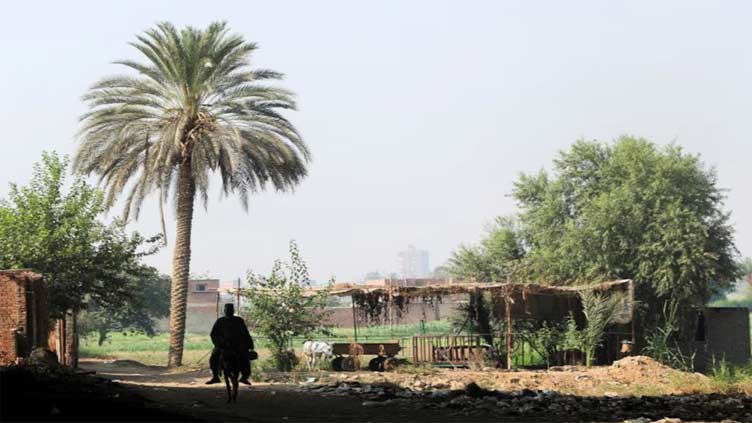Erosion of Cairo's green space leaves residents exposed to searing heat

World
Removal of green space in the capital became a topic of social media furore
CAIRO (Reuters) - Ahmed Belal's Cairo apartment used to overlook a cluster of trees that provided a much-needed refuge from pollution in a bustling area of the Egyptian capital while helping take the edge off intense summer heat.
But when a state drive to expand and widen main roads led to the uprooting of most of those trees in Greater Cairo's upscale Mohandeseen district, he decided to pack his bags and moved in 2022 to the suburbs.
"I sold my apartment ... to have a little bit of peace of mind and some green areas that I hope they won't go after," the 39-year-old doctor said.
Removal of green space in the capital and other cities became a topic of social media furore in recent weeks as temperatures soared, with many complaining that it was exacerbating the effects or climate change.
Temperatures in Cairo hit up to 43 degrees Celsius (109 degrees Fahrenheit) early in the summer, while the southern city of Aswan saw a near-record temperature of more than 49 C on June 6, according to the Egyptian Meteorological Authority.
In recent years, Egypt embarked on road construction projects it said would ease congestion in the traffic-clogged city and boost investment. But they also ate away at already sparse green spaces.
While recent public data is scarce, the environment ministry said last year that the average per capita share of green space in the country is only 1.2 square meters, far behind the World Health Organization's recommendation of 9 square meters.

Between 2017 and 2020, during the height of Egypt's road-widening works, Cairo lost around 910,894 square meters of its already limited green areas, according to Alternative Policy Solutions, a public policy research project at the American University in Cairo.
That loss risks exposing people to more life-threatening heat as climate change leads to more frequent heatwaves globally, and exacerbates the urban heat island effect, analysts say.
"In densely populated cities where heat can become oppressive, the presence of parks, gardens, and other green areas can help lower local temperatures, making outdoor spaces more pleasant and usable," said Sana Sherif, a Cairo-based environmental governance researcher and sociologist.
"Without adequate shade and cooling areas, residents are more likely to suffer from heat-related illnesses."
TRAPPED HEAT
Some trees and green space have been lost along the Nile, which runs through the heart of Cairo and provides almost all Egypt's fresh water.
On Dahab island, just south of the city centre, the widening of a ring road bridge has eroded agricultural lands, said Nabil Elhady of Cairo University, while a long concrete walkway is being constructed along the river's banks.
"Construction by default increases heat", said Elhady.
Egypt's road projects are not the only cause for the removal of green space, critics say, with parks also partially removed in parts of Cairo to make way for shops and cafes.
A spokesperson for Egypt's environment ministry declined to answer questions about areas where green space was razed in the absence of construction works, referring Reuters to public statements.
Last month, Cairo's governor Ibrahim Saber said in reaction to public criticism that no trees would be taken down unless a specialized committee examined whether they obstructed any projects.
Egypt, which hosted the COP27 UN climate conference in 2022, also said it had a scheme to plant 100 million trees from 2022-2029 nationwide, adding that 3.1 million had already been planted.

"Replacing trees that are deeply rooted with new trees is not that easy. You need a lot of money, workers, and maintenance," said Asmaa al-Halwagy, a veteran environmental activist and the chair of the Tree Lovers Association, which was founded in the 1970s to combat the loss of green spaces in Egypt's urban areas.
"We keep hearing them say 'we planted 50, 500, 3,000 or a million trees.' Where are those trees?"
'GREEN SPRAWL'
While Cairo's densely populated areas bear the brunt of Egypt's roadworks, green spaces are flourishing in residential compounds on the outskirts of the city, predominantly reserved for the well off.
A new administrative capital east of Cairo, President Abdel Fattah al-Sisi's flagship project, includes a 35km-long green river park.
Researcher Sherif said "green sprawl", or relocation of greenery to more affluent outskirts, had led to "a stark reduction in accessible green spaces for residents in the heart of the city", adding to social inequalities.
Cutting down trees deprives people of more than shade, said Halwagy, the activist.
"Trees show the identity of any place. Today, places are devoid of identity or memory," she said.


